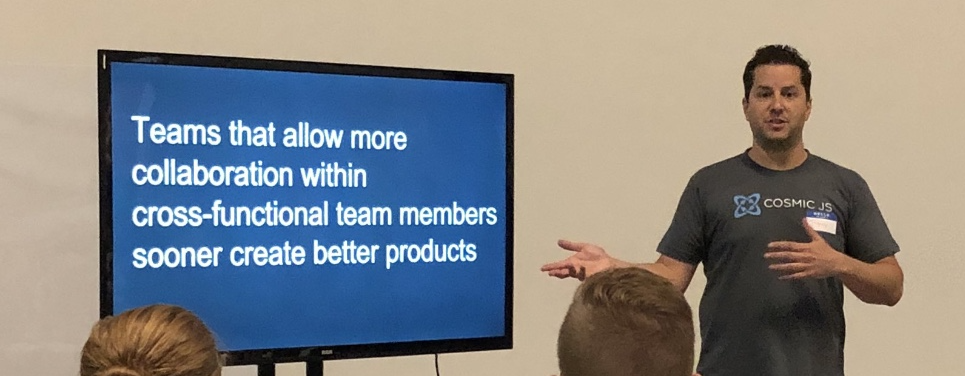Founder Interview

Tony Spiro, speaking at a local ReactJS Dallas Meetup.
Please welcome Cosmic JS to Hacker Noon! Cosmic JS is an API-first content management platform that helps teams of developers and content managers build apps faster together. I personally like their product, and without it, StoryLicensing.com would not be possible. Cosmic provides a web dashboard to manage content and powerful APIs for developers to deliver content to any new or existing application built in any programming language.
Today we’re going to catch up with Cosmic JS CEO Tony Spiro to discuss trends in content management, his career path from the agency world to starting his own tech company, and the balancing act of startup life.
David: Hey Tony! Could you share some numbers about the traction of Cosmic JS?(customers/usage/rev/team/etc.)

Tony: Since launching in 2016, we’ve seen thousands of developers from 120+ countries use Cosmic JS for application development and team collaboration. Many of the teams using Cosmic JS have also grown, including new user teams from various departments that are now more empowered to have a role in the content management process. We’ve seen growth in the number of use cases in which content is being managed, starting with simple blog content and evolving to include cross-platform content, native apps, AR / VR and content localized for 20+ languages and locales. And we’ve seen a lot of growth in our Community with regards to open-source submissions for our Apps and Extensions ecosystems.
Since there has been the internet, there has been demand for a system to manage content. Could you walk us through the history of content management systems? And maybe touch on where you think the software will evolve?
Content is and will always be king. And a content management system is a crucial part of an organization as it can either slow down or speed up business. All content management solutions are trying to enable teams of developers and content managers to work better together to produce content. This is an important and very difficult problem to solve.
In my software development career, I’ve used many different installed content management solutions: WordPress, Drupal, ModX, Joomla, building LAMP-stack websites. But there was a major problem with this installed-CMS approach: managing infrastructure sucks. I remember wasting a lot of time on non-core tasks. Managing databases, CMS server-side code, versioning, scaling problems, maintenance was all a nightmare. I noticed I was doing a lot of the same work with every new project. I knew there had to be a better way.
Cosmic JS evolved out of this pain point. The CMS API, or Headless CMS provides a web dashboard and API as a service. This allows developers to focus on building great user experiences within their application without having to manage CMS code. With each new project, you just spin up a new Bucket which instantly provides a web dashboard and API out of the box and all you need to do is connect the data source to your application. It is a dream CMS.
Though headless CMS solutions are fairly new, best-of-breed API services with web dashboards have been around for a little while and include Stripe for payments, SendGrid for email, Twilio for telephony, Algolia for search. They all offer a similar value in offloading non-core development work so developers can focus on building apps, not infrastructure. These API services are now powering our modern digital world.
Wordpress now powers an astonishing 30% of the internet’s websites, but the satisfaction levels have been mixed. I use it some, used to use it more. What has Wordpress done right to gain such massive adoption? And is trying to be everything to everyone so to speak, where are Wordpress’s weak spot?
I used to work in WordPress extensively in a past life in the the agency world.
WordPress, as a product, attained great popularity because it was able to abstract away technology for non-technical people. Without WordPress, we may not have the Shopifys and SquareSpaces of the world.
So it did a good job in making it possible for anyone to have a website as well as supporting their community to build templates and plugins. This is something we’ve made an integral part of Cosmic JS with community-contributed apps, extensions and integrations for API-first cloud development.
But I do agree that developer sentiment for WordPress has waned over the years. They were late to adopt the API-service / frontend application revolution that we are now entering. They do have the WP REST API, but we’ve been told it leaves a lot to be desired.
You’ve recently been building out your app developer marketplace. How many developers are building atop Cosmic JS? And to reach that point in a developer community, what misconceptions and breakthroughs did you uncover?
We’ve got an active community of hundreds of builders that are regularly contributing great educational content, Apps and Extensions to our ecosystem. This strategy serves two purposes: 1. A way to demo use-cases and peek under-the-hood for education purposes, 2. A way for customers to pull high-quality, ready-made applications off-the-shelf to further save them time in building on the Cosmic JS platform.
We’ve got hundreds of developers building on the Cosmic JS platform, some of which have shared their experiences and work with our community. We have the best developers in the world building on Cosmic and we’re really proud of the work they do. And we’ll be the first and loudest to show it off.
A misconception is, “If you build it they will come.” The better saying is “If you build it, you will need to go get them. But they will stay if they like what you’re doing and you give them a good experience…” haha.
What are your favorite apps and sites built with Cosmic JS?
I like all of the apps, but my favorites are the ones that push the boundary of what Cosmic JS can do. Some of these are the Algolia store, Ecommerce app, and User Management app.
Could you explain the strategic and technical advantages to a CMS being API first?
Developers can focus on the application layer, not infrastructure or CMS code. Content is stored in an API and can be delivered to any network-connected device: web, native iOS / Android, IOT, VR, etc. This is a huge business advantage as it saves a ton of time in getting content to market, where it’s needed.
You have a young daughter and work from home much of the time — just as I do. What are some of your productivity hacks for balancing/optimizing fatherhood and workload?
I keep a consistent schedule. Every day, we get up in the morning, watch Paw Patrol or Peppa Pig, and I take her to school. I work until I have to pick her up. And when I have her, she gets all my attention. It’s important to separate work time from Dad time. It keeps me balanced and happy.
Do you think that every developer should have tried writing their own content management system?
Yes! If anything, to appreciate how complicated it is. I built a CMS from scratch for one of the first websites I ever built.
What was the first site you made?
I’m a musician. I’ve been playing the drums since I was 10 years old, and the first site I made was a local music website for the Dallas / Ft Worth metroplex. At first it was just a static HTML calendar to keep track of upcoming shows at local venues. I became kind of obsessed and it ended up becoming an interactive social-networking website for bands and fans. At its peak it had band profiles with media upload, event management, online ticket-selling(thiswas pre-Stripe using Authorize.net!), a home-cooked content management system for creating articles and show reviews and to top things off, a paid banner advertising network.
What are your earliest memories of the internet?
I remember when I was 12, images loaded very slowly. I’ll leave it at that.
What’s been the most rewarding thing about making Cosmic JS? And what has been the scariest thing about making Cosmic JS?
The most rewarding thing is seeing teams use the platform on a daily basis and knowing that I’m helping to make their lives better. The scariest thing is worrying that we’re not doing enough for our customers! It’s a good fear, we’re always trying to provide a better service.
What is the long term vision of Cosmic JS?
A few things are not changing in the forseeable future: Software is eating the world. APIs are the delivery systems of the connected world. Content will always be king. Teams that can collaborate and deliver content faster will win. Continuing to build products that help teams all over the world build better applications, faster, together in this new API-powered economy. This is our northstar.
Cosmic JS is an API-first content management platform that helps teams of developers and content managers build apps faster together. Cosmic provides a web dashboard to manage content and powerful APIs for developers to deliver content to any new or existing application built in any programming language. Learn More.

